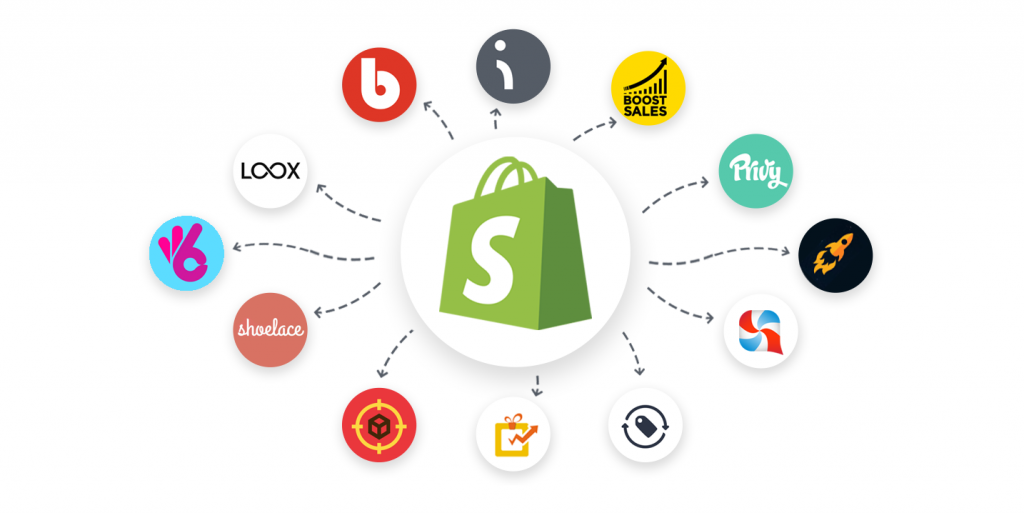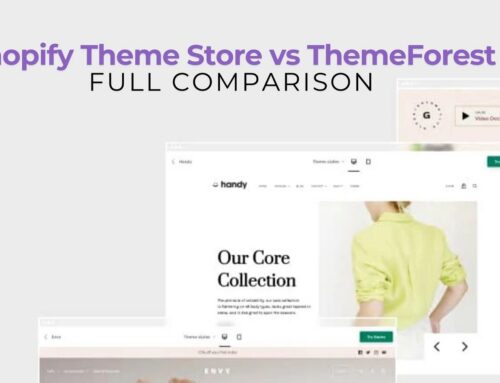Through this article, readers will be kept informed about all you need to know about Shopify vs OpenCart: which one is better for your business? Therefore, no more wasting time, let’s dive into the Shopify comparison of these two eCommerce platforms.

Contents
Shopify vs OpenCart: Overview
Online shopping has recently become a trend and the market has been flooded with different eCommerce solutions. But it is quite tough to pick the right eCommerce platform that suits your unique requirements. Shopify and OpenCart are the two eCommerce platforms used commonly nowadays. They serve various purposes but have their own strengths and weaknesses as well. Depending on usage requirements such as budget, ease of use, SEO, mobile, community, and support, have you chosen the right platform for your eCommerce websites.
Shopify
Shopify was started by a group of snowboarding enthusiasts in 2004, it has become one of the most popular platforms in the field of eCommerce, and possibly the easiest-to-use platform for creating your online store. It’s a completely functioning hosted solution built to provide you with anything you need to start selling online. More than 1 million enterprises across 175 countries worldwide are currently operated by this platform.
With Shopify, without any coding experience necessary, you can easily set up and open an online store within minutes. For newcomers and eCommerce sites that do not have tons of in-house technological tools, it would therefore be an excellent choice.
>> Read more: WordPress vs Shopify: Features, Pricing and Benefits Comparison

OpenCart
OpenCart is a popular open-source solution free of charge, known for its extreme simplicity and powerful set of functions. You will need to go through the implementation process of a website as a self-hosted solution, as well as locate a decent hosting service. Moreover, it has got a huge variety of extensions. The templated solution allows goods to be added and supports several languages and currencies.
OpenCart is fairly straightforward to configure, unlike most open-source systems. You can quickly and efficiently change the look of your OpenCart e-shop, thanks to an innovative template framework. Bear in mind that it may take some sufficient work to go deep into the customization of the store and appears to be more difficult than doing so on Shopify.

Shopify vs OpenCart’ Key Features
Cost
OpenCart
OpenCart is one of the most affordable solutions that would be a better fit for startups and businesses with a small budget. Of course, its marketplace has 13,000+ OpenCart extensions available, both charged and free. Once any improved extra functions are required, you will have to expend some of your money here.
However, users would have to pay for hosting and domain name while the site is open. Being a light network, however, hosting expenses are very cheap.
To start with, the web host can charge you at least $4 a month for a regular OpenCart site. The larger your business, the more you can expect to pay for hosting. Customization expenses come second. While some of the OpenCart website plugins are available for free, either a one-off price or annual fees are paid for the more strong ones. The kits range from $10 to $489, while regular eCommerce themes cost between $16 and $999 (OpenCart themes). And if you like comprehensive customization, that’s unique to what you would pay a developer.

Shopify
Shopify will offer you three plans to choose from after a 3-day free trial. It provides varying price levels and extra features, ranging from $39 to $399 a month based on the package you are on. A domain name, SSL license, and web hosting are already provided with both of these programs, unlike open-source platforms.
In order to get any useful functionality, you may need to buy third-party apps and add-ons. These expenses will start piling up as the organization expands.
You will be able to sell an infinite range of items, regardless of what package you want, and enjoy advanced eCommerce features, such as Facebook/Pinterest/Twitter Purchase Icon.

Hosting & Performance between Shopify vs OpenCart
Shopify
Shopify is a completely hosted solution, and the platform takes care of all hostings and also has a strong hosting environment that provides the following:
- PCI Compliant Hosting
- Unlimited Bandwidth
- Unlimited Storage
- 99.9% + Uptime
- Global CDN
- Free SSL Certificate
Shopify has a pretty good performance. One Shopify user said he was using the London-based server and the rest of their hosting is based in North America and estimated that the average loading per window is 1.60 seconds. Isn’t it cool?
>> Related topic: Shopify Payments vs Stripe – 5 Key Differences To Concern
OpenCart
Compared to Shopify, OpenCart is a self-hosted solution that relies on the hosting environment that is being used to manage it too.
OpenCart is known for being a very lightweight platform and the loading time of 0.37 seconds is very impressive, but due to the number of elements that can affect the performance of open source applications, this can only be seen as a reference.

Design and Customization of Shopify vs OpenCart
OpenCart
For online retailers, OpenCart provides a range of themes, most of which are entirely mobile-optimized and very nicely designed. Currently, the marketplace lists more than 1,600 templates, which is a remarkable amount relative to other eCommerce solutions.
You can also grab models from third-party sellers such as Themeforest or Template Monster for this platform’s more feature-rich design options.
OpenCart is fairly simple-to-use, unlike other common open-source systems. Its sophisticated template framework helps you to quickly and effectively change the look and sound of your online store. For one it provides several pre-modifications so that you can quickly add them to your web. However, it may seem to be relatively difficult when it comes to shopping customization and involves programming skills.
By only using the underlying code, OpenCart renders itself dynamically flexible and extendable. You should expand the capabilities of your shop and provide a customized eCommerce framework that aligns with your store’s goals.

Shopify
The visual consistency of its themes is one of Shopify’s biggest selling points. They totally look out of the box. Shopify offers 9 free templates for eCommerce that you can use, and each of these comes with two or three different versions, giving you a fair range of template choices to pick from.
Installing and applying Shopify themes to customize the look of the store is also pretty simple for users. The owner of Shopify says that to create a beautiful online store, you don’t need any technical or design experience. In addition, the packaged themes are pleasing, and they are beautiful and simple too which ensures they can show well on all platforms.
Shopify now offers a theme shop with more than 70 different themes. These Shopify themes are all mobile-optimized and with several coloring choices, support a decent selection of company styles. Users can therefore conveniently pick a style that fits their business functionality.
All in all, the offering of the Shopify template is of high quality, but if you are not pleased with the options offered and want to make something that is completely original, there is always the possibility of creating your own style.

SEO features
The fact is that the main sources of eCommerce traffic are search engines. 51% of all web traffic is generated from organic search, and related searches usually affect 39%of online transactions. When selecting a website for your web, that alone is enough to make SEO one of your primary concerns. More about the differences between Shopify vs OpenCart in terms of SEO feature:
Shopify
No need to emphasize the value of the highest positions in search engines for the good results of your website. If this factor is to be considered, Shopify has more improved features. According to a recent analysis on the best SEO eCommerce website, Shopify’s scoring is 98.In order to refine the store-level content to guarantee higher SERP places, Shopify provides a simple set of SEO features for consumers. For example, you can edit meta tags, add images with alt text, build 301 redirects, auto XML sitemap, etc. Notably, this site offers SSL certificates for the check-out of your shop and for any content hosted on your domain.
Moreover, Shopify is also filled with several marketing features ranging from email and SEO marketing to social media marketing.

OpenCart
OpenCart is adaptive to well-equipped SEO features. But don’t presume that the website will be configured by default. You yourself have to take care of the finer info.
In order to match them with applicable SEO concepts, OpenCart also enables users to format meta-data, product details, categories, plus individual web pages. Even better, there are many SEO extensions in the marketplace that have proved to be very successful at their work. Leveraging them makes things a lot smoother for the whole thing.
Also, try making yourself a few extra ads and digital media extensions based on your desired targets. Then you could combine them with the affiliate features of OpenCart, which can set up, handle, and monitor discounts plus coupon promotions.
A simple collection of SEO features is provided by OpenCart, however, optimizing it is your work. By contrast, the site is not properly configured by the web as it should be. This implies that, as other eCommerce solutions might, OpenCart will not work automatically on search engines in the most pleasant manner.
In reality, OpenCart enables its users to make some major SEO improvements. On the bright side, the marketplace provides a multitude of extensions that you can use to boost the SEO efficiency of your store.

Apps for Shopify vs OpenCart
OpenCart
When asking about the collection of applications, OpenCart delivers very well. In several different areas, such as patterns, languages, payment methods, shipping methods, reports, order totals, etc the OpenCart marketplace is currently loaded with more than 13,000 extensions. Therefore by combining these extensions with your store, you can extend your store capacity quickly. It should be remembered that some of the software is free to download, although they range from $50 to $100 most of the time.
Shopify
Shopify helps you to quickly incorporate some additional features and functionalities to your online store with more than 3,200+ applications available, such as ratings, loyalty services, consumer wish list, in-depth analytics, print labels, and more.

Pros and Cons of Shopify vs OpenCart
To help you determine, using our overview below you can compare the pros and cons of both platforms. The information is collected from both users’ opinions and the author’s.
>> You may concern: A Comparison of Shop Pay vs PayPal – Which One Best Suits Your Needs?
Is Shopify suitable for you?
| Benefits | Drawbacks |
|---|---|
| Completely hosted, quickly set up and managed platform | Antique/ Simple design |
| Suitable affordable-priced platform | Difficult to make backend code changes |
| Outstanding templates | Extra charges when using payment gateways from third parties (apps, themes) |
| Extensive features for all plans | Reports on the lowest-priced package are not available |
| Amazing customer service | |
| Speed | |
| Web-based applications, including hosting, updates, and functionality based on plans | |
| Mobile phone applications for eCommerce management, in-person sales, and customer chat management | |
| Email marketing systems, free ad credits and incorporation with social media provide marketing resources | |
| Integrated multi-channel distribution platforms for selling | |
| SEO-friendly URLs, meta explanations and sitemap creation automatically | |
| Built-in reports on market | |
| Multiple currencies, taxation and languages |
Is OpenCart suitable for you?
| Benefits | Drawbacks |
|---|---|
| Intuitive and easy to use for a self-hosted platform | SEO canonization difficulties/ Lack of SEO functionalities |
| Eye-catching eCommerce templates and design | Requires effective and professional web building skills |
| Free of charge | Advanced features require extensions |
| Support multiple languages and multiple currencies for users | Slow checkout experience |
| Well-adapted to a different interface and unique cart functionality | Limited marketing features |
| Multiple-store functions | Security issues |
| SEO meta tags per product and category | Not included customer support |
| Responsiveness and SEO friendly | |
| Open-source for those with software development experience, and completely editable |
Shopify vs OpenCart: which one is better
There is no question that both Shopify and OpenCart are extremely functional platforms for eCommerce, and any platform will support the business well.
Comparing Shopify vs OpenCart is not an apple-to-apple experience, they are completely different tools for building your online store, both will help you make sales online and ensure that your company stands out.
It is not an apple-to-apple experience to make a comparison between Shopify vs OpenCart, they are entirely different platforms for building your online store, but both will help you make online purchases and ensure that your business stands out.
It seems like OpenCart is best geared to newcomer firms, also better-suited for businesses that for their eCommerce website creator would like a bit more versatility and customization, as well as those that are trying to stop paying a recurring membership fee.
However, if you are searching for an out-of-the-box platform that comes with everything you need to get started online, run as easily as possible, and manage it seamlessly in one location, then Shopify is one of the most common solutions on the market. For new store comers, it is full of payment processing options, eCommerce functionality, and inventory tracking software that are perfect. If you ever wonder whether using Shopify or building a website on your own then we have your answer.
All in all, the final decision depends on your personal needs and business requirements. Note to pick the platform with the most powerful functionality that ideally meets the most useful and necessary priorities.
Curious about Shopify vs Ecwid as well? Let’s find out which one is better now.




